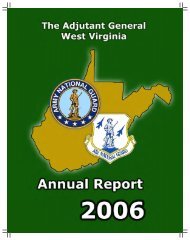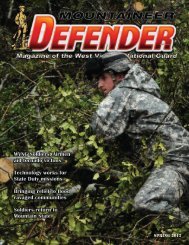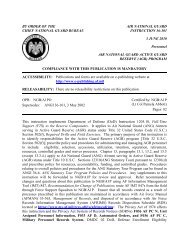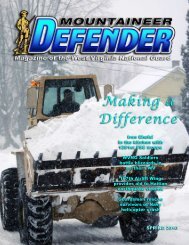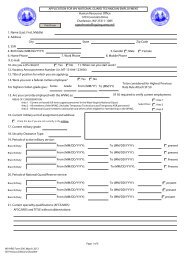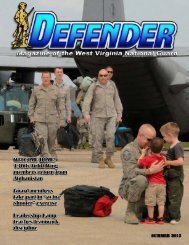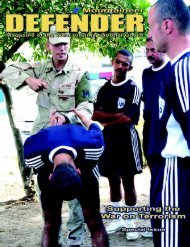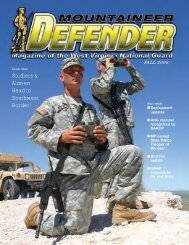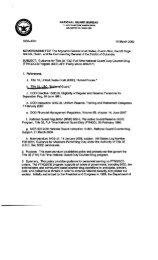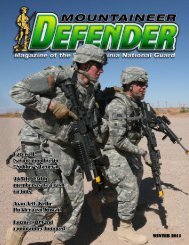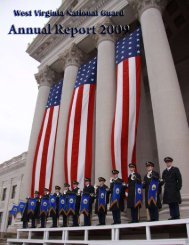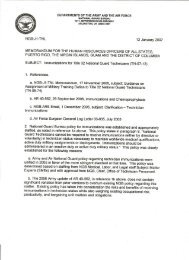Family Programs - West Virginia Army National Guard - U.S. Army
Family Programs - West Virginia Army National Guard - U.S. Army
Family Programs - West Virginia Army National Guard - U.S. Army
Create successful ePaper yourself
Turn your PDF publications into a flip-book with our unique Google optimized e-Paper software.
Transitionadvisor helpsvets accessbenefits,entitlementsby Lisa SilverFormer Transition Assistance AdvisorAddressing <strong>Guard</strong> members’ mental healthby Elizabeth CoffeyWVNG Director of Psychological HealthAbraham Lincoln once said, “In the end, it’s notthe years in your life that count. It’s the life in youryears.” This quote emphasizes that increasing one’squality of life is critical.No one is immune to stress. And stress, ifnot managed appropriately, can lead to negativeoutcomes. Statistics indicate that 49 percent of <strong>Army</strong><strong>National</strong> <strong>Guard</strong> members reported psychologicalhealth concerns on the Post-Deployment HealthReassessment conducted approximately three monthsfollowing deployment.In response to these reports, as well as the everincreasingoperational tempo impacting all facets ofthe Armed Forces, the Department of Defense hasdeveloped several programs to deal with stress feltby service members and their families before, duringand after a deployment. One of these programs-- specifically addressing the psychological needsof Reserve Component service members and theirfamilies -- places a Director of Psychological Healthat each <strong>National</strong> <strong>Guard</strong> Joint Forces Headquarters.One of the main objectives of the DPH is toassist service members and their families in taking aproactive approach to psychological wellness. Totalmission readiness demands that <strong>Guard</strong> members beas ready psychologically as they are physically.Unfortunately, seeking behavioral health serviceshas a negative stigma attached to it. Individuals areoften concerned about appearing weak or worriedthat their military careers will be negatively impactedif they seek assistance. Therefore, a major task ofthe DPH is to address an individual’s psychologicalissues in the quickest, least restrictive and mostconvenient manner, while strictly respecting the<strong>Guard</strong> member’s confidentiality.The DPH is responsible for overseeing andcoordinating behavioral health services includingassessment, referral, clinical case management andfollow-up services. Positive results can be achievedif individuals are provided with appropriate tools andresources.But wellness is not only about mission readiness.It must include all aspects of the service member’slife -- including spouses and children.In the event a service or family memberexperiences a critical situation and assistance isneeded immediately, DPH services can be accessedat any time by contacting the <strong>West</strong> <strong>Virginia</strong> <strong>National</strong><strong>Guard</strong>’s DPH, Elizabeth Coffey, at (304) 561-6690,(304) 546-1026 or by email, elizabeth.coffey@us.army.mil.Survivor Outreach welcomes new coordinatorby Leigh Ann HillWVNG Survivor Outreach Services CoordinatorI am the Survivor Outreach Service Coordinatorfor the <strong>West</strong> <strong>Virginia</strong> <strong>Army</strong> <strong>National</strong> <strong>Guard</strong>. My goalfor this program is to improve services for survivors,improve responsiveness and streamline the assistanceprocess for families.Survivor Outreach demonstrates the <strong>Army</strong>’scommitment to families of the fallen. This serviceis a multi-agency approach to delivering services tocommunities where families live.My role as the SOS Coordinator is to providelong-term support for survivors; form groups andnetworks that will give surviving families theopportunity to receive support; work closely withbenefit coordinators and the Casualty AssistanceOfficer to ensure survivors receive needed services,guidance and assistance in regards to benefits andentitlements and work with Military <strong>Family</strong> Honorsand offer support services to survivors of our retiredservice members.I will be researching local, state and federalbenefits and entitlements, and meeting with militaryleadership, social services, military agencies, andprivate groups that can serve as resources.I am going to partner with 4-H groups, veteran’scenters, American Legions, Rotary Clubs, and anynon-profit agencies that have a heart for the militaryto be resources for our families.I want to make a difference one family at a time.For more information, please call (304) 561-6830.<strong>Guard</strong> members work, live, andplay in communities across <strong>West</strong><strong>Virginia</strong>. Yet accessing care, benefitsand entitlements once they return froma deployment can be challenging. Thejob of the Transition Assistance Advisoris to collaborate with federal, state, andcommunity agencies and resourcesto strengthen and expand the web ofsupport available to veterans and theirfamilies.The mission of the TransitionAssistance Advisor is to facilitateoptimal access to medical care andbenefits for Operations EnduringFreedom and Iraqi Freedom veteransand their families. The TAA servesas an advisor to the Joint ForcesHeadquarters leadership to identifybarriers and challenges encounteredand recommend actions necessary toovercome them. The TAA also talkswith lawmakers to let them knowwhat service members need in orderto receive the care and services they sorightly deserve within federal, state andcommunity facilities and agencies.Another facet of the TAA’s job isto provide education and support toservice members, families and retireesthrough briefings all over the state. Theadvisor participates in demobilizationand reintegration events and coordinatesall Veterans Affairs involvement for thePost-Deployment Health Reassessmentscreenings. The TAA also helps withimportant issues such as VA healthcare,Tricare, employment, education andaccess to counseling services.All returning veterans are stronglyencouraged to enroll in the VAhealthcare system. Establishing VAeligibility quickly after returning fromoverseas will alleviate the search forsupporting documentation at a laterdate, making access to benefits andentitlements much easier.For more information, or to speakwith someone in the TransitionAssistance office, please call(304) 561-6824.5
Military and <strong>Family</strong> LifeConsultants offer WVNGfamilies ray of hopeby Donna CookeMilitary <strong>Family</strong> Life ConsultantDuring a routine visit to his primary care physicianfor treatment of amyotrophic lateral sclerosis,commonly known as Lou Gehrig’s disease, a Soldierwith nearly 25 years of service discussed some of theissues his family was facing.One issue was the family’s lack of income due tothe Soldier’s inability to continue working. He wasvery concerned about preparing legal documents toprotect his family in case he became incapacitated,but he had no money for an attorney.Because the Soldier’s physician was familiar withthe Military and <strong>Family</strong> Life Consultant program, areferral was made and a meeting coordinated with thefamily to assess their concerns. The MFLC called onmilitary and civilian resources to meet the family’slegal, emotional, financial and physical needs.Many resources from the <strong>West</strong> <strong>Virginia</strong> <strong>National</strong><strong>Guard</strong> <strong>Family</strong> <strong>Programs</strong> Office were used. Travelfunds for the family were provided by a local VFWPost, and a retiree from Morgantown assisted withlodging while the family was there. Several retireeseven came to the hospital to provide support to thefamily during long hours spent in the waiting room.Through the combination of a grant from the <strong>West</strong><strong>Virginia</strong> <strong>National</strong> <strong>Guard</strong> Foundation and donatedlabor from a local Sons of American Legion chapter,a wheelchair ramp was built at the Soldier’s home.In addition to making a referral for legal services,the MFLC guided the family in reapplying for SocialSecurity disability benefits. A consultant also referredthe family to counseling -- helping address eachmember’s emotional needs during a difficult time.Military and <strong>Family</strong> Life Consultant programemployees are available to help with these services anytime, not just during deployment and reintegration.Consultants are available to assist with issues thatimpact quality of life and are trained to help meetthe needs of all military families, particularly thoseserving in <strong>National</strong> <strong>Guard</strong> and Reserve units that arenot connected to a military installation.For more information about how Military and<strong>Family</strong> Life Consultant personnel can assist you orsomeone you know, call Donna J. Cooke at (304)545-5714 or e-mail at donna.j.cooke@mhn.com.Benefits available to active,reserve componentand retired WV militaryby Toney ColagrossoWVNG Tricare RepresentativeThe Department of Defense provides affordablehealth care for all members of theU.S. military. Before the 1980s, only a fewhealth care options were available to servicemembers, their families and retirees. Militarymembers received their treatment at militarymedical facilities. Retirees and family memberseither received free treatment at militarymedical facilities, or they could enroll in CivilianHealth and Medical Program UniformedServices to receive government-subsidizedmedical care from civilian providers.Tricare has since replaced these limitedplans. Tricare is complex, so personnel needto understand the system in order to get thebest care. Tricare is a regionally-managedhealth care program for active, reserve and retiredmembers of the armed forces, their familiesand survivors.Tricare brings together the healthcare resourcesof the <strong>Army</strong>, Navy and Air Force, andsupplements them with networks of civilianhealth care professionals to provide better accessand high-quality service while maintainingthe capability to support military operations.Currently, five Tricare options are availableto service members and their families: TricareStandard, Tricare Prime Remote, Tricare AssistanceManagement Program, Tricare forLife and Tricare Reserve Select• Tricare Standard is a program for activeduty military members, military families,and retirees under age 65. With this plan enrollmentis not required and there is no monthlypremium. However, this plan does have adeductible, co-pays, and a catastrophic cap.• Tricare Prime Remote is a programfor active duty members and their eligibledependants. Under this plan, the member andeligible family members are required to signup with a Primary Care Manager and receivecare and referrals through this physician. Thisplan has no monthly premium, deductibles,co-pays, or catastrophic cap.• Tricare Assistance Management Programis a plan is for active duty members andtheir eligible family members. This plan coversthe active duty member and their eligiblefamily members with Tricare Standard for 180days following discharge from active duty.This plan is used for the members returning toDrill Status, and is used after all unused militaryleave has been taken.• Tricare for Life is a plan for retireeswho are covered by Medicare Part B. WithMedicare Part B paying 80 percent, Tricare forLife pays the remaining 20 percent. By usingMedicare Part B in conjunction with Tricarefor Life, retirees have 100 percent medicalcoverage. Tricare for Life also pays all butthe $3, $9, or $22 cost share for prescriptionmedication.• Tricare Reserve Select is a plan fortraditional members of the <strong>Guard</strong> or Reserveand their eligible family members. This planworks like Tricare Standard. The service membermust enroll and pay monthly premiums,annual deductibles and cost shares. Monthlypremiums for this plan are currently $47.51for a member only plan, $180.17 for servicemember and family plan.Many service members say that the cost ofTricare Reserve Select is less than what theservice member is paying for health coveragethrough a civilian sponsored health plan.The first step to using any Tricare Plan isto have all dependents enrolled in the DefenseEnrollment Eligibility Reporting System.6
<strong>Family</strong> Assistance Centersaid service, family membersby Judy Reed<strong>Family</strong> Assistance Center CoordinatorDuring one of the coldest days of 2008, acommander overheard a Soldier talking abouthaving problems keeping her house warm.The boiler system heating the home was notfunctioning properly and would cost a lot ofmoney to get repaired.The Soldier’s husband, who was deployed,had installed a wood burning stove beforedeploying, but she and her three children wereliving in one room of the house to stay warm.The couple had no support system here asboth of their families lived out of state.The Soldier was referred to one of the<strong>National</strong> <strong>Guard</strong>’s <strong>Family</strong> Assistance Centers. Astaff member at the assistance center contacteda veteran’s service organization to request helpfor the family. The VSO member contactedthe family and scheduled a time to assess theheating system. It was determined that a smallgas heater, complemented by the wood burningstove, would be sufficient to heat the home untilthe deployed spouse returned and could replacethe existing boiler system.A gas heater was purchased for the familyusing a CareNet grant received by the W.Va.<strong>National</strong> <strong>Guard</strong> <strong>Family</strong> <strong>Programs</strong> Office.After the gas company checked existing linesin the house to make sure they were safe, afellow service member, along with a volunteer,installed the heater.<strong>Family</strong> Assistance Centers are locatedaround the state to assist members of all militarybranches. Staff members provide informationon a host of topics and -- in more challengingTypes of supportprovided by <strong>Family</strong>Assistance Centers:• Referral to federal, state andlocal humanitarian agencies andveteran’s service organizations• Roof repair/replacement• Repair/replacement ofheating systems• Coordination betweenhospital and deployed servicemember to webcast the birth of aservice member’s child• Minor home repairs• Emergency assistance due tonatural disasters• Minor car repairs• Referrals for financialassistancecases like the one described above -- referralsto resources within the <strong>National</strong> <strong>Guard</strong> orsurrounding community.Professional consideration and confidentialityare fundamental elements found at each<strong>Family</strong> Assistance Center.Staff members make contact with familiesthrough phone calls, e-mails and letters. Provingthe need for family outreach, the <strong>Guard</strong> hasreceived more than 185,000 contacts in the pastthree years.<strong>West</strong> <strong>Virginia</strong> has seven <strong>Family</strong> AssistanceCenters located throughout the state. The<strong>Family</strong> Assistance Center in Charleston isstaffed around the clock to meet the emergencyneeds of families when other offices are closed.<strong>Family</strong> <strong>Programs</strong>improve qualityof life for familiesby Maj. Allen MartinState <strong>Family</strong> <strong>Programs</strong> DirectorSince the Revolutionary War, one challengehas remained constant for members of the armedforces -- the personal sacrifices service membersand families make on a daily basis. <strong>National</strong> <strong>Guard</strong>families know the pain of this sacrifice, enduringlong periods of separation and often called on toleave familiar surroundings and establish a newhome in a strange place. It is the spouse that bearsthis burden, enabling the service member to carryout the mission.Prior to 1989, few <strong>West</strong> <strong>Virginia</strong> <strong>National</strong> <strong>Guard</strong>units had structured readiness groups. They didhave auxiliaries -- spouse-run groups who’s mainfunction was to raise funds and hold social events.Through the years, auxiliaries have evolved,developing a system of working together to meetthe challenges associated with military life. Today’s<strong>Family</strong> Readiness Groups evolved from a reactivesupport role to a proactive role aimed at educating,informing and looking after each other in times ofseparation and uncertainty. Families wanted morethan support -- they wanted to be as trained andready as the service members going off to war.The <strong>Family</strong> <strong>Programs</strong> Office has a team ofdedicated staff members managing programsdesigned to enhance quality of life of servicemembers and families. <strong>Family</strong> support outreachinitiatives are designed to ease demands oncommanders by improving morale at home.Maj. Gen. Allen E. Tackett, <strong>West</strong> <strong>Virginia</strong>Adjutant General, understands families form acritical part of the strong foundation needed for<strong>National</strong> <strong>Guard</strong>smen to be successful. Happyfamilies mean happy Soldiers and Airmen, whichleads to improved retention and readiness.Useful Phone Numbers<strong>Family</strong> Assistance CentersCharleston FAC (304) 561-6545Glen Jean FAC (304) 201-3221Wheeling FAC (304) 201-3586Eleanor FAC (304) 201-3087Camp Dawson FAC (304) 791-4055130th AW FAC (304) 341-6625Martinsburg FAC (304) 616-5590Member/<strong>Family</strong> ServicesSurvivor Outreach (304) 561-6830Transition Advisor (304) 561-6824Psychological Health (304) 561-6690Tricare (304) 779-2685Military and <strong>Family</strong> Life Consultant (304) 545-5714Child and Youth <strong>Programs</strong> (304) 561-6821Judge Advocate General (304) 561-63237
AroundKids Kamp participants raise the flag that Staff Sgt. Eppie Jaramillosent his son, Matt, from Afghanistan.Matt Jaramillo, 12, son of Staff Sgt.Eppie Jaramillo, 167th AeromedicalEvacuation Squadron, holds the U.S.Flag his father sent him from Afghanistan.The flag was flown over Staff Sgt.Jaramillo’s base for 13 days before beingshipped home to be flown at KidsKamp 2009.Photos by Mike Pitzer, JITEC Public AffairsKids Kamper brings flag, pride from Afghanistanby Mike PitzerJITEC Public AffairsKINGWOOD, W.Va. (June 18, 2009) -- Twelveyear-oldMatt Jaramillo is attending the <strong>National</strong><strong>Guard</strong> Kids Kamp at Camp Dawson, Preston Countythis week. His father, Staff Sgt. Eppie Jaramillo isa member of the Martinsburg, W.Va., based 167thAeromedical Evacuation Squadron and is currentlyserving in Afghanistan.Jaramillo shipped a U.S. flag that was flown overhis base in Afghanistan from May 12 until MemorialDay 2009. Jaramillo shipped the flag home witha personal letter instructing his son to fly the flagduring the 2009 Kids Kamp.“I am excited. My dad wanted me to bringthis flag to the camp,” Matt said. “I was proudthat he built the flag pole and flew the U.S. flag inAfghanistan.”Kids Kamp is hosted by the <strong>West</strong> <strong>Virginia</strong><strong>National</strong> <strong>Guard</strong>. More than 230 children fromaround the state are attending this year. The kampersparticipate in craft activities, learn to work as teams,and observe traditions such as raising the colorseach morning.This Wednesday morning at Camp Dawson,Matt Jaramillo and his fellow Kid’s Kampers raisedthe U.S. Flag his father sent him from overseas.Kids Kamp participants receive a karate lessomixed martial arts group from Dunbar, W.Va.Photos by Lt. Col. Mike Cadl8Soldiers, family members and retirees tat the commissary on-site sale in ElCommissary Agency stores from Virgand other areas bring in meats, dry goitems to set up mini-commissaries at Nacross the state.
the stateBlast off!Courtesy photoLaunching water rockets at Kids Kamp with help from the <strong>West</strong> <strong>Virginia</strong> Starbase Academy.The W.Va. Air <strong>National</strong> <strong>Guard</strong> mini C-130 rolls through the streets of South Charleston during the city’s annual Armed Forces Day parade. South Carleston isbelieved to host the longest-running Armed Forces Day parade in the nation.Courtesy photon from White Tiger Karate, ae, JFHQ Public Affairs Officeook advantage of dealseanor, W.Va. Defenseinia, Washington DC,ods, produce and otherational <strong>Guard</strong> armoriesPhoto by Lt. Col. Mike Cadle, JFHQ Public Affairs Office9
Air <strong>Guard</strong> offers programs for members, families“We should never forget that we’re successfulbecause of the love and support of our families,and we owe our families a great debt of gratitudefor their unwavering support.”- Command Chief Master Sgt. Ronald Bowe130th Airlift Wingfamily programs stafftargets individual needsby Sharon Peters130th Airlift Wing <strong>Family</strong>Program CoordinatorAir <strong>Guard</strong> family programsare relatively new compared to<strong>Army</strong> <strong>National</strong> <strong>Guard</strong> programs.Prior to 2001, family membersand loved ones of service memberswere usually the foundationfor base family programs. After9/11, as more and more Air <strong>National</strong><strong>Guard</strong> units began deploying,ANG leaders realized that afull-time person managing familyprograms was needed.Today, there are 88 Wing<strong>Family</strong> Program Coordinatorsworking in U.S. states and territories.This means that an Airmanor family member can travel toany ANG base and find a personwho can provide assistance. Italso means collaboration betweenthe Wing Coordinators in helpingeach other serve Air <strong>Guard</strong> memberswherever they may be.A good example of that supportoccurred when the 130thAirlift Wing had an Airman deployingwith another unit -- locatedacross the country -- whoneeded assistance getting paperscompleted before deploying thenext day. The 130th AW <strong>Family</strong>Program Coordinator workedwith the deploying unit’s coordinatorand first sergeant to getthe papers signed and faxed tothe Airman in time for him to deploy.But family programs are notjust the responsibility of the fulltimecoordinator. <strong>Family</strong> support,like many other personnel issues,is a command program, and onethat can have a significant effecton morale and readiness.Recently, the family of a deployedAirman requested assistancemoving to a new home. Theunit was advised of the request bythe <strong>Family</strong> Program Coordinator,but the situation was complicatedby the fact that the family wantedto move on a drill weekend andthe spouse was having surgery thefollowing week. Four men fromthe member’s unit volunteered tohelp with the move. Two of thevolunteers were still on leave followingtheir own deployments.It is times like these that makebeing involved in <strong>Family</strong> <strong>Programs</strong>worthwhile -- when youknow that whatever is done, howeversmall, made a difference foran Airman or family member andlightened their load, easedtheir worry, and helpedsolve a problem.New 167th Airlift Wingfamilies welcomed to unitalongside incoming Airmenby Susan Sanders167th Airlift Wing <strong>Family</strong>Program CoordinatorOperations Iraqi and EnduringFreedom have presented manychallenges for deployed <strong>Guard</strong>members and their families. TheIraq deployment set two records atthe 167th Airlift Wing -- the longestdeployment and largest number ofmembers mobilized in the unit’shistory.After the deployment, Col. RogerNye, Wing Commander, congratulatedmembers of the family programs stafffor their hard work.“Due to the FRG and the <strong>Family</strong>Program Coordinator, there werevery few family issues that reachedmy office,” he said during a <strong>Family</strong>Readiness Group recognition dinner.<strong>Family</strong> Readiness Groups havemuch success at the 167th AirliftWing because support begins oftenbefore deployment is even thoughtof. As soon as members join theunit, they and theirfamilies are invitedto an orientationbriefing their first weekend on base.Then, throughout an Airman’s career,volunteers, retirees, and the Wing<strong>Family</strong> Program Coordinator provideresources, programs and activitiesto keep families informed and bringthem together.When deployments do occur,briefings and information packetsare provided to families prior to theAirman’s departure, and monthlycourtesy calls are made to check ontheir well-being.Information on programs suchas Military OneSource, MarriageEnrichment, Yellow Ribbon, andservices provided by the VeteransAffairs offices are also provided.Supporting Airmen and theirfamilies can be challenging as manysituations encountered are veryunique, and it is important to rememberthat <strong>Family</strong> <strong>Programs</strong> support not onlyAir <strong>Guard</strong> members, but also militarymembers and families of any branchof service, as the following examplesillustrate.A Marine family whose son hadbeen wounded in combat calledrequesting directions to AndrewsAir Force Base, Md., as the Marinewas going to be flown there fortreatment. The <strong>Family</strong> ProgramCoordinator was able to give thefamily directions to Andrews andget members in touch with theliaison officer that would meet theirson’s flight. His parents were able tovisit with him for a few hours and tofeel better about his injuries.Another situation involved adeployed <strong>Army</strong> Reservist who wasconcerned that he had not completedremodeling a furnace that his familywould need when the weather turnedcolder. The <strong>Family</strong> ProgramCoordinator was able to contactthe president of a company whodeveloped a schedule for completingthe work under a very affordablepayment plan.10
y Spc. Ruth McClary30th HBCT Public AffairsBAGHDAD (July 8, 2009) -- <strong>West</strong> <strong>Virginia</strong>’sMartinsburg Institute recently donated$5,000 to the 150th Armored ReconnaissanceSquadron, 30th Heavy Brigade Combat Team“Cavalry Pride” family readiness group tosupport the squadron’s homecoming awardsbanquet next year.The Institute, located in Martinsburg, has anactive enrollment of 87 <strong>West</strong> <strong>Virginia</strong> <strong>National</strong><strong>Guard</strong> members, and school officials wanted tosupport the student-Soldiers working towarddegrees while serving their country.“We had a great experience providingeducation for military personnel, and throughthose relationships we acquired an evengreater respect and admiration for what servicemembers are doing for us and the country,and we just wanted to express it,” said BillCochrane, the institute’s military educationmanager.Cochrane presented the family readinessgroup with a check to cover expenses forwelcoming home celebrations, phone cardsand sports equipment for the Soldiers andevents for the Soldiers’ families during thedeployment.“We were proud to provide financialassistance to support the celebration of <strong>West</strong><strong>Virginia</strong> <strong>National</strong> <strong>Guard</strong>smen returning homesafely from deployment,” Cochrane said.“The family readiness group, Soldiers, andtheir families are extremely grateful and veryappreciative for the generous and thoughtfuldonation,” said Sheila Rakes of Beckley,W.Va., the Cavalry Pride support coordinator.“The money has really provided solidground for all of the goals that we want toachieve.”The institute takes into account the specificneeds of its deployed students.“We are very flexible and focused onmilitary needs,” Cochrane said. “We areaware that Internet and computer access canbe problematic for many military students.“Martinsburg’s model allows studentsPhotos by Sgt. Waine D. Haley, 30th HBCT Public Affairs OfficeSoldiers of 150th Armored Reconnaissance Squadron, 30th Heavy Brigade Combat Team, hold the Martinsburg Institute banner at Camp Stryker June 10 in appreciation for a$5,000 donation to support the squadron’s family readiness group. The banner circulated to all locations the squadron occupies in Iraq for Soldiers to sign thank you messages onbefore it was returned. The school, located in Martinsburg, W. Va., donated the money to cover expenses for a welcome home awards ceremony banquet.Martinsburg Institute donates to Cavalry Pride FRGto better overcome these typical problemsby progressing without Internet access forsignificant periods of time,” he added.Oceana, W.Va., native Sgt. Christopher Nelson, 150thARS, 30th HBCT, signs the Martinsburg Institute bannerto express his appreciation for the donation.11
Youth programs offer support, fun for WV military childrenby Susan IzzoWVNG Child and Youth <strong>Programs</strong> CoordinatorIn 2008, the Defense Manpower Data Centerreported that 7,120 military children residedin <strong>West</strong> <strong>Virginia</strong>’s 55 counties. Of that number,nearly 5,000 were school-aged.That is why it is so important to provideoutreach activities for military children -- a taskthe Child and Youth <strong>Programs</strong> staff enjoys verymuch. Military children are special and unique.They share a parent with the world in order todefend our way of life. They sacrifice a normalfamily life so we may all benefit and they do notask for anything in return.Unlike children of active duty parents wholive on or near a traditional installation, ReserveComponent families often live without the benefitof being near a military base where they canaccess programs and support systems to help dealwith stress and issues that come when a parent isin the military and facing deployment.One of the events geared toward <strong>West</strong> <strong>Virginia</strong><strong>National</strong> <strong>Guard</strong> and Reserve children is KidsKamp, conducted at Camp Dawson, W.Va.Children attending are able to participate inactivities that their military parents experience,only with a little more fun. Campers sleep inthe barracks, eat in the mess hall, visit the firingrange, learn to march and sing cadences, and --probably one of the most important activities --bond with other military children.Child and Youth <strong>Programs</strong> Office personnelalso celebrate the Month of the Military Child in“I’ll never forget my first KidsKamp. It was a very hot summerweek but it turned out to be anexperience I’ll never forget.It was so very overwhelming, but ina way that was good for the soul.That summer, Kids Kamp wascelebrating its 16th year and we hada record breaking year.More than 200 military kids fromaround the state attended. The kidswere watched over by a group ofabout 60 volunteers who are the mostdedicated volunteers you could everask for.”- Suzan IzzoApril. Adjutant General Allen E. Tackett signedand presented more than 450 military youthwith certificates of appreciation, honoring themfor their service. There was also a celebration atthe Eleanor Armory where 48 children and theirparents had a dance, great food and bouncy house.Military parents also had the opportunity to pickup information on resources available to them.Child and Youth <strong>Programs</strong> staff is also involvedin community and national outreach programsaimed at supporting military families. Our <strong>West</strong><strong>Virginia</strong> staff was proud to host the SupportingChildren of <strong>National</strong> <strong>Guard</strong> and Reserve Institutethrough our partnership with the Military ChildEducation Coalition. The two-day program, heldin Morgantown, W.Va., was attended by nearly 50people who received valuable training providedthru MCEC at no charge to the attendees.Participants discussed the deployment cycle,emotions military children experience as a resultof their parents’ service, and resources educators,counselors and community members can useto best meet a child’s need. Staff members alsoparticipated in school counselor workshops,school-based health workshop, <strong>West</strong> <strong>Virginia</strong>Social Work Conference, CareNet Governor’sConference, and the State Volunteer Conferenceby providing displays, handouts, and providingpresentations.It is our goal during these community outreachevents to create a network of community supportfor our geographically dispersed military families,helping to minimize parental concerns duringtimes of deployment.While having fun is a very important part ofworking with military children, the CYP staffalso works to support our military families duringdeployments by providing them information onnational, state and local programs available toease the stress of deployment. Staff membersparticipated in many deployment and reunionbriefings and activities during 2008.Our CYP staff will continue to build uponnetworking opportunities, explore educationalpartnerships, and work with community servicegroups to ensure that programs provided tomilitary children meet their needs and interests,while providing the support needed to strengthenmilitary families.For more information on Child and Youth<strong>Programs</strong>, please call (304) 561-6821.Photos by Spc. Anna-Marie Hizer, Joint Forces HQ Public Affairs Office(Left) A military child creates forensic evidence duringMountain State University’s forensic workshop at Kids Kamp.(Above) Campers measure the distance between pieces ofevidence for a crime scene sketch. Campers at the annualevent, located at Camp Dawson, Kingwood, W.Va., participatein a variety of activities that allow them to have fun and get ataste of their parent’s military lives.12
Not in DEERS?Benefits, eligibility may be compromisedby Sgt. Michael K. ClarkDEERSMilitary OneSource yoursource for informationby Patricia SnodgrassMilitary OneSource RepresentativeWhether it’s help with child care, finances, emotionalsupport during deployments, relocation information, orreunion and reintegration, Military OneSource is here forservice members and their families.For example, during a deployment a service memberworked with researchers at Military OneSource to explorescholarships. Military OneSource employees located fivescholarships for the service member’s family.Military OneSource is a support service providedat no cost to service members and their families by theDepartment of Defense. It serves as an extension of supportservices and is available 24 hours a day, 365 days a year.The program is especially useful to service members andfamilies who live far from an installation.Military OneSource provides consulting and counselingto service members and family members for deploymentstress, relationships, parenting, and grief and loss.Employees also provide guidance on financial, educationand career issues. Specialty consultations in special needs,education and finances are also provided.Consultants provide information and make referralson a wide range of issues. Free face-to-face mental healthcounseling in the member’s local community (up to sixsessions per issue) is also available.Web-based services are also available. The OneSourcewebsite gives service members and families access tohundreds of articles, booklets, CDs, and tool kits forconcerns about wellness, deployment, parenting, childcare, relocation, education, and reunion and reintegration.Users can view, download or order materials free of chargeat www.militaryonesource.com. Child care, summercamp and distance-learning center locators can also befound on the website. In addition, financial calculators,online workshops, podcasts, and the opportunity tocommunicate with a consultant are available.To reach a Military OneSource counselor, call 1-800-342-9647 or visit www.militaryonesource.com.The Defense Enrollment EligibilityReporting System is a database of servicemembers, family members and retirees whoare entitled to Tricare and other benefits.Registration in DEERS is required to receivemany of the benefits available to militarymembers and their families -- includingTricare. Active-duty, <strong>National</strong> <strong>Guard</strong>, Reserveand retired service members are automaticallyregistered in DEERS, but they must take actionto correctly register their family members.Mistakes in the DEERS database can causeproblems with Tricare claims, so it is critical tomaintain DEERS information. This informationcan be verified by calling the nearest uniformedservices personnel office, an ID card facility;the regional Tricare-managed care supportcontractor; or the local Tricare service center.Sponsors or registered family members maymake address changes; however, only thesponsor can add or delete a family memberfrom DEERS, and proper documents -- suchas a marriage certificate, birth certificate, ordivorce decree -- are required to make suchchanges.To update DEERS information:Visit your local uniformed services personnel•office or contact the Defense Manpower DataCenter Support Office at 1-800-538-9552.Uniformed services personnel office listingscan be found at http://www.dmdc.osd.mil/rsl/.• Fax address changes to DEERS at 1-831-655-8317.• Mail the address change to the DefenseManpower Data Center Support Office, ATTN:COA, 400 Gigling Road, Seaside, CA 93955-6771.• Go online to Tricare to update information:http://www.tricare.osd.mil/deers/.Things to Keep in Mind:• Each family member’s eligibility recordmust be updated separately when changesoccur.• Any changes that impact you or your family-- for example: marriage, birth, divorce ordeath -- need to be reported to DEERS so thateligibility can start or stop under Department ofDefense and service guidance.• If you are active duty and re-enlist, separate,retire, or move, make sure your information getsupdated in DEERS as soon as possible. If youdo not, you and your family might experiencea break in eligibility, which means a break inhealth care coverage.• As soon as you re-enlist, take yourreenlistment paper to your personnel supportcenter or ID card facility so your informationcan be updated before your previous enlistmentexpires rather than waiting for the paperwork togo through distribution.• Once you retire, you need to make sureDEERS reflects your change from active dutyto retiree status.• If you or your family were previously TricarePrime under your active duty status, you needto re-enroll in Tricare Prime under your retireestatus. Contact the regional managed caresupport contractor in your retirement locationto find out if Tricare Prime is offered in yourarea.• It is important to update your home addressesbecause Tricare information will be sent to thataddress.• Retail network pharmacies check Tricareeligibility through DEERS. Your prescriptionswill be filled only if you are in the system.• If you have a child that is over age 21 anda full-time student, you need to get his or herstudent status entered into DEERS so thatTricare eligibility is not interrupted and accessto health care is not lost.• If you or a family member is Medicareeligible,entitled to Part A and enrolled in PartB, DEERS must be updated to reflect MedicarePart A and B status to retain Tricare coverage.When you turn 65, the medical section of yourmilitary ID card may also need to be updated.13
Amidst War, CharityRed Cross aids familyduring tough timesby Karen AllenAmerican Red CrossA <strong>West</strong> <strong>Virginia</strong> resident and U.S. <strong>Army</strong> veteranwas struggling with brain, back and knee injuriessustained while serving in Iraq. The Soldier’s wifequit her job so she could take him to extensive medicaland physical therapy appointments.A clerical error with one of the Soldier’s militarypaychecks left the family strapped for cash. Unless theservice member came up with money to pay delinquentproperty taxes, his home would be auctioned off onthe courthouse steps.Now this family -- with three children, ages 16, 15and 10 -- was in the financial fight of their lives.The family came to the Central <strong>West</strong> <strong>Virginia</strong>Red Cross to apply for an emergency loan through amilitary aid society. The news was not the miracle thefamily had prayed for. While funding was provided forhousehold expenses, the money for property taxes wasdenied because it was not considered a daily expense.Determined Red Cross volunteers scrambled tofind a solution. They worked the phones, did researchand tried to reassure the family. Volunteers contactedCareNet, a program operated by the <strong>West</strong> <strong>Virginia</strong>Council of Churches that identifies available resourcesand needed support networks for military membersand their families.On the same day the home was scheduled to besold at auction, a grant in the amount of the delinquenttaxes was approved through CareNet. The familywould not be forced to leave the home.When a crisis happens, Red Cross provides asupport network, information and referral, and candeliver emergency messages and work to help thosewho are facing a hardship. For those who hadsacrificed so much, it is an honor to be of service.The Red Cross now offers free Coping withDeployments: Psychological First Aid for MilitaryFamilies, a course designed for military familymembers. The course was developed by the RedCross to specifically address the stresses and strainsthat deployments bring.For details or to schedule a course in yourcommunity, contact your local Red Cross Chapter orKaren Allen, Manager of Service to Military Familiesfor <strong>West</strong> <strong>Virginia</strong>, at allenk@usa.redcross.org.<strong>Family</strong> Readiness Assistant:A guiding force before,during, after deploymentby Jessica Tackett<strong>Family</strong> ReadinessRed, white and blue filled the Air <strong>National</strong><strong>Guard</strong> hangar on a hot summer day. Streamers,flags, and banners of all shapes and sizeswere in every space of the hangar and thefence surrounding the runway. Feelings ofexcitement and anticipation filled the hangar. Itwas breathtaking when the planes landed andthe engines stopped turning.This scene was described by a <strong>Family</strong>Readiness Support Assistant. But the rushof excitement when Soldiers stepped offthose planes would not be possible withoutmuch planning and preparation. Planning ahomecoming ceremony is part of a <strong>Family</strong>Readiness Support Assistant’s duties andincludes many tasks -- coordinating withby Chaplain (Lt. Col.) Bruce ReedFull Time Support Chaplain,<strong>West</strong> <strong>Virginia</strong> <strong>Army</strong> <strong>National</strong> <strong>Guard</strong>It is a team effort to provide ministry to themembers and families of the <strong>West</strong> <strong>Virginia</strong><strong>National</strong> <strong>Guard</strong>. Presently, the ReligiousSupport Team includes 13 chaplainsand 13 chaplain assistants. Thesepastors, Soldiers and Airmen aremotivated by love of God, Soldier,family, and country.The RST mission is to ensurefree expression of religionwithin the <strong>West</strong> <strong>Virginia</strong><strong>National</strong> <strong>Guard</strong>, which isa religiously pluralisticcommunity. Membersof the RST are peopleof faith, bringing avariety of religioustraining and values fromtheir personal and localchurch experiences.The RSTs are best knownfor Ministry of Presence -- beingwith Soldiers and Airmen in their dailyroutines. During this time of high intensityoperations, RST members bring privatemoments of listening and understanding forthose working through challenging issues.RST personnel are frequently called uponto perform religious services. Chaplains enjoymany opportunities to be with <strong>Guard</strong> familiesduring weddings and funerals as well asthe arrival location, decorating the building,helping families with banners, and working withseveral veteran’s groups such as the Veteransof Foreign Wars, American Legion, Am Vets,Patriot Riders and the Women’s Auxiliary.These groups provided refreshments for morethan 2,000 people that were there to welcomehome the 111th Engineer Brigade from a yearlongdeployment to Iraq.<strong>Family</strong> Readiness Support Assistants havebeen placed at brigade-level units to maintainthe continuity and stability of unit <strong>Family</strong>Readiness Groups as those organizationsexperience changes in volunteer leadership.Taking the administrative burden offvolunteers allows FRG leaders to concentrateon performing outreach to service membersand their families. In a nutshell, FRSAs helpcommanders implement a family care programthat educates, informs, and assists servicemembers and families dealing with the uniquedemands of military life before, during andafter deployments.Ministry teams support troops day-to-dayspeaking at local events such as Memorial Dayand Veterans Day celebrations.At any moment, RST members may becalled on to provide compassionate and skilledreligious support in emergencies such assuicide prevention, civil emergency, familycrisis and casualty notifications.Religious Support Teams are integralto religious education, especiallythe Marriage Enrichment weekends.Team members also provide Biblestudies and religious items, workingwith organizations like GideonInternational and InternationalBible Society.The support teams areresponsible for briefingdeploying servicemembers and families onsuicide prevention, battlemind and reunion andreintegration.As staff officers,chaplains are also requiredto advise command of thespiritual, moral, and ethical healthof the units. This can also involve a liaisonbetween Soldiers, their commanders andhigher headquarters.Motivated people of faith serving on RSTswould describe their mission as a calling toministry with Soldiers, Airmen and families ofthe <strong>West</strong> <strong>Virginia</strong> <strong>National</strong> <strong>Guard</strong>. Chaplainsand chaplain assistants go, with strength ofspiritual courage, where many would not.14
Yellow ribbon binds familiesby Stacey TolerYellow Ribbon Support StaffThe <strong>West</strong> <strong>Virginia</strong> <strong>National</strong> <strong>Guard</strong> YellowRibbon Program began in 2008 and supportedfour innovative events. Program events are heldpost-deployment at the 30, 60, 90 and 180-daymarks for units that have been deployed.These events are typically located in arelaxing environment away from militaryinstallations or armories and are coordinatedwith area hotels, conference centers or resorts.Activities for the 111th Engineer Brigade’s 30-day event were held in Eleanor, W.Va. Eightyninesoldiers attended, bringing with them 66family members. The unit’s 60-day event was heldat a hotel in Charleston, W.Va., in conjunctionwith the Freedom Salute ceremony. Turnout forthis event was notably greater, with more than275 Soldiers and family members attending.The 821st Engineer Company should becommended for their attendance as well during 30-and 60-day reintegration Yellow Ribbon events.The unit’s 30-day event was held in Charleston,W.Va., and boasted nearly 200 Soldiers and familymembers. The 60-day event -- held in Flatwoods,W.Va. -- brought 177 Soldiers and their familiestogether at the center of the state.The <strong>National</strong> <strong>Guard</strong> Bureau has providedspecific guidance regarding the Yellow RibbonProgram. The program is designed to servemembers from all service components. ThePhoto by Lt. Col. Mike Cadle, JFHQ Public Affairs OfficeMaj. Gen. Allen E. Tackett, The Adjutant General, <strong>West</strong><strong>Virginia</strong> <strong>National</strong> <strong>Guard</strong>, poses with Gov. Joe Manchin,members of the WVNG <strong>Family</strong> <strong>Programs</strong> office and Legislativerepresentatives at an <strong>Army</strong> <strong>Family</strong> Covenant meeting.<strong>National</strong> <strong>Guard</strong> has established and coordinatedefforts for all states and territories that will allowconcise and unified support to service membersand their families. This guidance helps providefor a safe, healthy and successful reintegrationfollowing deployments.Events are funded through <strong>National</strong> <strong>Guard</strong>Bureau and cover lodging, mileage and food.Childcare is also offered for younger familymembers at no cost to the service member.Each event provides a network of informationand brings a buffet of resources to one table.During each deployment phase, the YellowRibbon Program offers information on resourcesavailable to service members and their families,such as Military One Source, veteran’s benefits,<strong>Family</strong> Assistance Centers, DEERS, ID Cards,Tricare, Marriage Enrichment, Military <strong>Family</strong>Life Consultants, American Legion, OperationHome Front, Child and Youth Services, <strong>Guard</strong>Foundation, CareNet, Wounded Warrior Programand Am Vets, in addition to other local andstate organizations to include some communityoutreach services.Feedback for the Yellow Ribbon Programhas been phenomenal. “It’s a fun, informative,family inclusive event,” said Sgt. Hissem, 111thEngineer Brigade. He added that during hisprevious deployment there was only a minimalamount of information and resources availablebefore and after his deployment.Hissam said he is grateful for the care andattention that the Yellow Ribbon Program offers<strong>National</strong> <strong>Guard</strong> Soldiers and families. He addedthat the program gives family members a chanceto let their hair down for a weekend and enjoyeach other’s company.“The food was great, the rooms were nice andthe information was helpful,” he said. Hissenadded that if given the opportunity, he would doit again.The <strong>West</strong> <strong>Virginia</strong> <strong>National</strong> <strong>Guard</strong>’s YellowRibbon staff is looking forward to working with<strong>Guard</strong> command, families and communities forfuture events and is hopeful for the success of theYellow Ribbon Program.FRG volunteers go extra mile for Soldiers, familiesby Cathy HammackState <strong>Family</strong> Readiness AssistantDuring my first week as a <strong>Family</strong> ReadinessAssistant, I received a call from a mother ofa deployed soldier. After we talked for a fewminutes, she told me that she could not go on.Her son had deployed and she had no reasonto get out of bed.As a military spouse and mother my heartwas breaking for her, but my mind was goingcrazy with all the ideas I had to help her. Isuggested she volunteer with the unit’s <strong>Family</strong>Readiness Group, collecting calling cards tosend to deployed Soldiers. I also told her thatwe had several community resources willingto help, and I gave her the information neededto contact those resources.Two days later the mother phoned and toldme that I had “saved her sanity” and “givenher a reason to get up.” I knew then that I had abig job ahead of me, and that there were manymore families to reach who needed a reason toget up in the morning.<strong>National</strong> <strong>Guard</strong> Bureau began fundingfamily readiness assistant positions inOctober 2003. Commanders are requiredto create and support <strong>Family</strong> ReadinessGroups, but many commanders needed helpmobilizing volunteers to manage unit FRGprograms. <strong>Family</strong> Readiness Assistants actas liaisons between units and FRGs, whichallows commanders to focus on mission.The FRA’s main function is to coordinateFRG development and sustainment. FRAstrain and support FRG outreach efforts bylinking the FRGs, <strong>Family</strong> Assistance Centersand Rear Detachment Commanders so theycan communicate with one another.A successful FRG program promotes peaceof mind, togetherness, and instills pride inindividuals, families and units.In 2008, <strong>West</strong> <strong>Virginia</strong> <strong>National</strong> <strong>Guard</strong><strong>Family</strong> Readiness Group members racked upan amazing 14,899 volunteer hours, whichequates to nearly $300,000 worth of familysupport services if the <strong>Guard</strong> had to paysomeone to provide the same services.15



